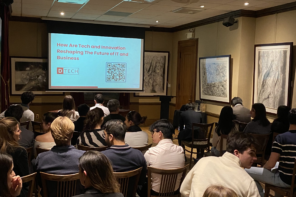Sustainability project to shift focus towards tangible action in final phase

Vision 2020, one of the largest and most comprehensive sustainability initiatives on campus, is now entering its third year. To mark this milestone, the Vision 2020 Project Team recently released its first Impact and Failure Reports to celebrate the successes of the past three years, while identifying shortcomings. This is particularly valuable as the project transitions from community outreach to action.
Vision 2020 released the Impact and Failure Reports in hopes of determining barriers to change and inefficiencies in their model before progressing into the third and final stage of the project. Phases one and two focused primarily on community engagement events and the development of ‘big ideas’ on which to base subsequent actions towards sustainability. Vision 2020 then took their findings to members of the McGill community to allow them to determine what form institutional reform should take.
Over the past year, the organization has hosted 28 events to engage the McGill community in a public discussion on what form sustainability should take in the context of McGill and Montreal. There were over 1,000 participants whose input contributed to the “Action Plan,” a document first drafted in June of this year to outline concrete steps towards achieving sustainability goals set forth by the community.
Although community engagement was successful, the failures report acknowledges that the organization should have done more to meet their own standards of sustainability and inclusiveness. Many events were intended to generate discussion and feedback, meaning that they often ran for three or more hours in the middle of the day. This timeframe was ideal for students, yet it excluded faculty and senior administration whose schedules are relatively more inflexible. Additionally, not all events were fully handicap accessible, and event organizers forgot to arrange recycling and composting for all events.
Because organization’s work up to this point has been largely intangible, there has been confusion as to what Vision 2020’s role on campus is. “Some people don’t understand that Vision 2020 is both a process and an output with concrete deliverables,” explained Project Coordinator Josée Méthot. “Part of that is the sustainability strategy, but we are also looking into how we can better showcase the hard work of different partners around the community.”
This year the project is moving into its third and final stage of implementation, shifting focus to tangible projects. “There has been community engagement, but now we are becoming something more concrete that people can sink their teeth into,” commented Jessica Marais, a Vision 2020 coordinator. “Hopefully the project will be able to manifest the big ideas the community has produced in more tangible projects.”
“We are considering sustainability from a holistic perspective,” noted Méthot. “There is a misconception that sustainability only means environmentalism. It has to be addressed from social, environmental and economic perspectives.”
“We are looking at a lot of different things,” exclaimed Josée, “but were recognize that some actions are easy wins while others are big ideas.” These big ideas include the redesign of McTavish Street, establishing a faculty fellows program to promote the study of sustainability and a sustainable labs project.
Both Méthot and Marais emphasized that these changes are long-term and will only be achieved by continued community engagement. “Because we are funded by the Sustainability Fund, Vision 2020 won’t last forever,” conceded Méthot. “However, we hope that our organization lays the framework for these long-term goals to be achieved.”
Although significant administrative change is long-term, there are initiatives on campus that are beginning to take shape. Lily Schwarzbaum, a recent McGill graduate and McGill Office of Sustainability (MOOS) Intern pointed to the Tactics for Research Creation project as one such success. The project is intended to showcase professors partnering with students to approach research in innovative ways.
On Thursday, Vision 2020 hosted Lift-Off: The Sustainability Soirée. The purpose of the event was to highlight installations such as Tactics for Research Creation that are not projects from “the usual suspects,” explained Schwarzbaum. “Moving forward to want to even more on how we construct sustainability to accurately reflect that holistic definition.”
A holistic approach to sustainability can be subdivided into five categories: research, education, connectivity, operations, and governance and administration. Vision 2020 hopes that by addressing all five aspects that they can successfully shift McGill’s culture to one where sustainable practices ingrained in the institutions decision making process on all levels. “We want to make sustainability part of McGill’s DNA,” joked Marais.
It is this approach that sets Vision 2020 apart from previous sustainability initiatives on campus. “Sustainability is about making connections between people,” clarified Schwarzbaum. “It’s about the connections between research with education, faculty with students and working across fields of study.”
To better encourage the development of relationships Vision 2020 has established a 20-person steering committee to allow students, faculty, operation staff, and administrators to share ideas and coordinate efforts across faculties.
Justin Berot-Burns, a current third year student and Tech Consultant to MOOS, is currently developing an Applied Student Research wikipedia page to further promote discourse across faculties. The page will catalog professors who are currently participating in research concerning issues of sustainability. The page will also list classes across all faculties and fields of study that consider sustainability in their curriculum. “We want this to become a hub for people who want to study sustainability regardless of their faculty,” he said. “Hopefully, it cultivates a demand for specific projects and classes.”
As Vision 2020 moves towards into its final stages it is important to remember that the project is as much about inspiration and coordination as it is about tangible change. “There isn’t a quantitative benchmark to show when Vision 2020 has succeeded,” concluded Schwarzbaum. “Vision 2020 will have won when people recognize the importance of having a direction that’s founded on real consultation and momentum that already exists on campus.”







